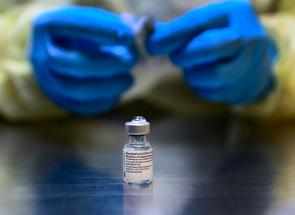Patience, please… science is working
Read this article for free:
or
Already have an account? Log in here »
To continue reading, please subscribe:
Monthly Digital Subscription
$0 for the first 4 weeks*
- Enjoy unlimited reading on winnipegfreepress.com
- Read the E-Edition, our digital replica newspaper
- Access News Break, our award-winning app
- Play interactive puzzles
*No charge for 4 weeks then price increases to the regular rate of $19.00 plus GST every four weeks. Offer available to new and qualified returning subscribers only. Cancel any time.
Monthly Digital Subscription
$4.75/week*
- Enjoy unlimited reading on winnipegfreepress.com
- Read the E-Edition, our digital replica newspaper
- Access News Break, our award-winning app
- Play interactive puzzles
*Billed as $19 plus GST every four weeks. Cancel any time.
To continue reading, please subscribe:
Add Free Press access to your Brandon Sun subscription for only an additional
$1 for the first 4 weeks*
*Your next subscription payment will increase by $1.00 and you will be charged $16.99 plus GST for four weeks. After four weeks, your payment will increase to $23.99 plus GST every four weeks.
Read unlimited articles for free today:
or
Already have an account? Log in here »
Hey there, time traveller!
This article was published 30/03/2021 (1719 days ago), so information in it may no longer be current.
Science can be messy. We rely on it to help us understand the mysteries of life; to find solutions to what ails the human body, to cure disease and alleviate pain.
We want it to be consistent, easily understandable, reliable. It rarely is.
Science is dynamic. Its conclusions evolve in the face of changing evidence. What the “science shows” one day can be debunked the next, as additional information emerges and new assumptions are considered.
As such, the public sometimes loses faith in the scientific process.
In a pandemic — where the reliance on science is critical — an erosion of public trust can have a deadly impact. If people lose faith in an otherwise safe, effective medical intervention — a vaccine — the costs could be catastrophic.
Those are the risks now surrounding the AstraZeneca COVID-19 vaccine, as recommendations around its use continue to evolve.
On Monday, Manitoba and other provinces paused its use for people under 55 after a rare side-effect (blood clots) was reported among young women in Europe.
The vaccine has proven safe for the vast majority of people and highly effective in preventing serious illness and death. Manitoba is expecting a shipment of 54,600 doses from the United States this week.
However, like many medical interventions, it can produce adverse effects in a minority of people; somewhere between one in 100,000 to one in a million.

The job of science is to determine whether a treatment produces a net benefit: do its life-saving qualities outweigh the risks?
“We want this vaccine program to be safe, and while we still believe that probably the benefits for all ages outweigh the risks (of the AstraZeneca vaccine), I’m not comfortable with ‘probably,’” said Dr. Joss Reimer, medical lead for Manitoba’s COVID-19 vaccine task force.
Nor should she be. “Probably” is not good enough.
There should be greater certainty around the net benefits of AstraZeneca before resuming its use for people under 55 — a decision which could be made as early as this week.
The changing recommendations around the AstraZeneca vaccine from the scientific community have been unfortunate, but not out of the ordinary. Earlier this year, the vaccine was not recommended for people over 65, because of a lack of older people in the original clinical trials.
That was later reversed, after real-world evidence showed it was safe for the elderly.
Now, it’s being paused for people under 55, for different reasons.
It’s easy to see how some might get the impression scientists don’t know what they’re doing; one day, it’s potentially unsafe for the elderly, the next, it may be harmful to younger people.
AstraZeneca will, in all likelihood, get the green light for all age groups. It’s already been widely used around the world with very few side-effects– not much different than most other vaccines or medical interventions.
There are valid explanations, which Reimer has eloquently provided. The changes are based on evolving information and the decisions made have been out of an abundance of caution. They want to study the new data; they want to get it right.
The public needs to show patience, and let the science do its work.
AstraZeneca will, in all likelihood, get the green light for all age groups. It’s already been widely used around the world with very few side-effects — not much different than most other vaccines or medical interventions.
The flu shot can also cause severe adverse effects, including allergic reactions, but it’s extremely rare.
In 2017-18, there were two deaths that had “temporal associations” with the influenza vaccine in Manitoba (most years there are none). Five people who received the flu shot that year required treatment in a hospital emergency department.
Despite that, people don’t stop getting the flu shot; the benefits of immunization (death avoidance, in some cases) far outweigh the potential side-effects.
The messaging campaign around AstraZeneca will need to be robust enough to counteract the events of the past few months. The minds of many won’t be easily changed.
The erosion of public trust around it will hurt the COVID-19 immunization campaign, but the harm is not insurmountable.
tom.brodbeck@freepress.mb.ca

Tom has been covering Manitoba politics since the early 1990s and joined the Winnipeg Free Press news team in 2019.
Our newsroom depends on a growing audience of readers to power our journalism. If you are not a paid reader, please consider becoming a subscriber.
Our newsroom depends on its audience of readers to power our journalism. Thank you for your support.





